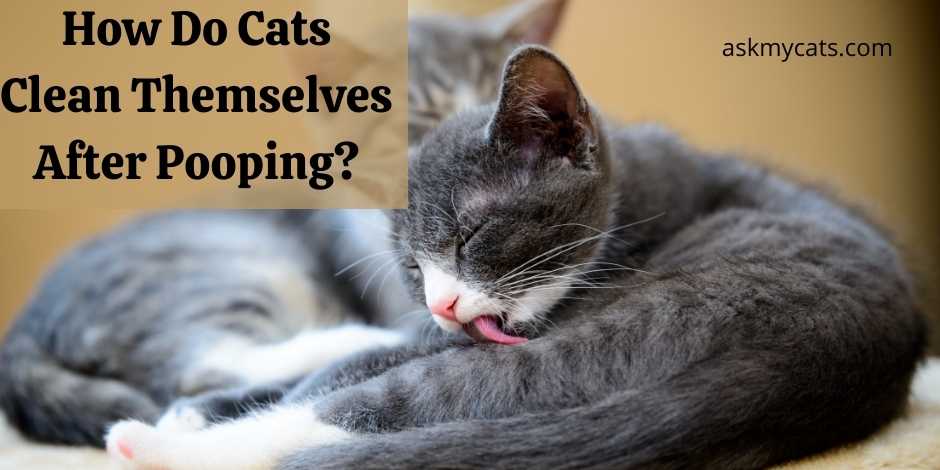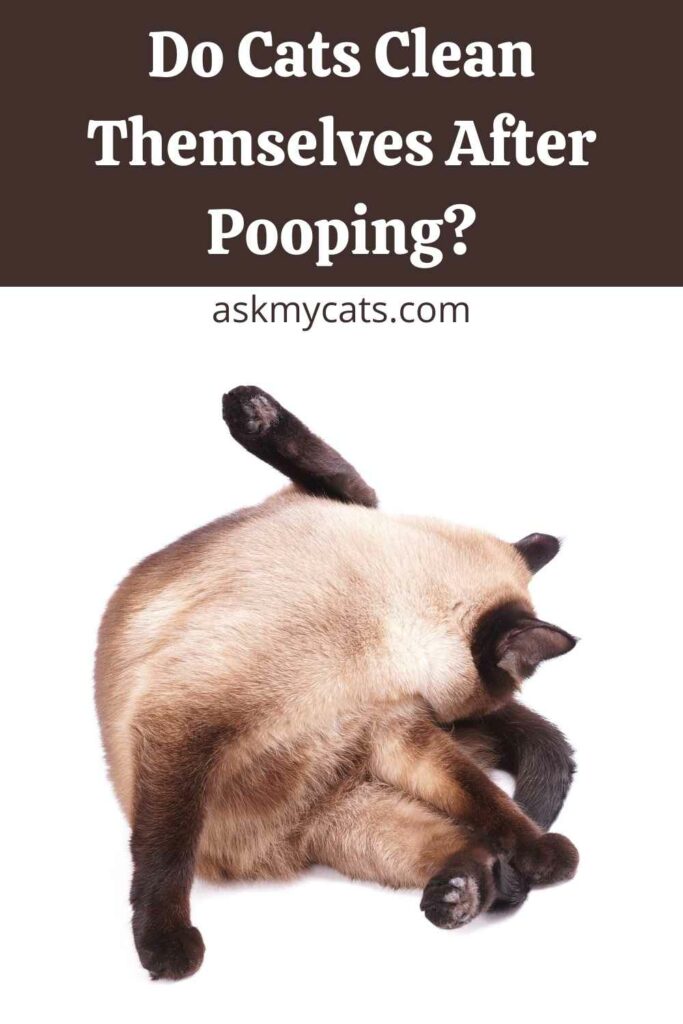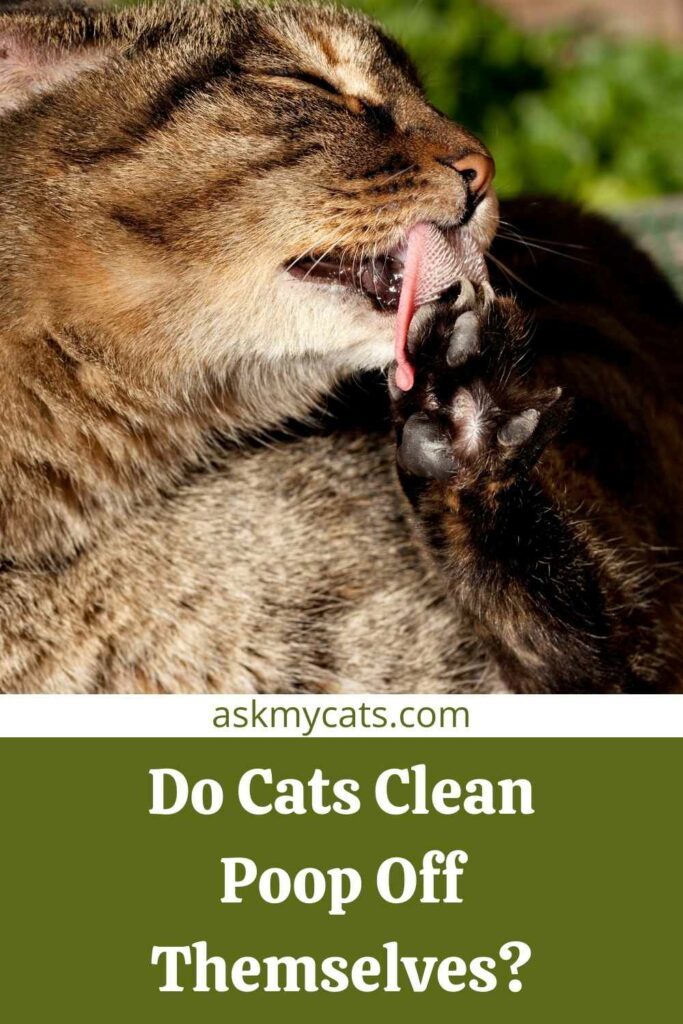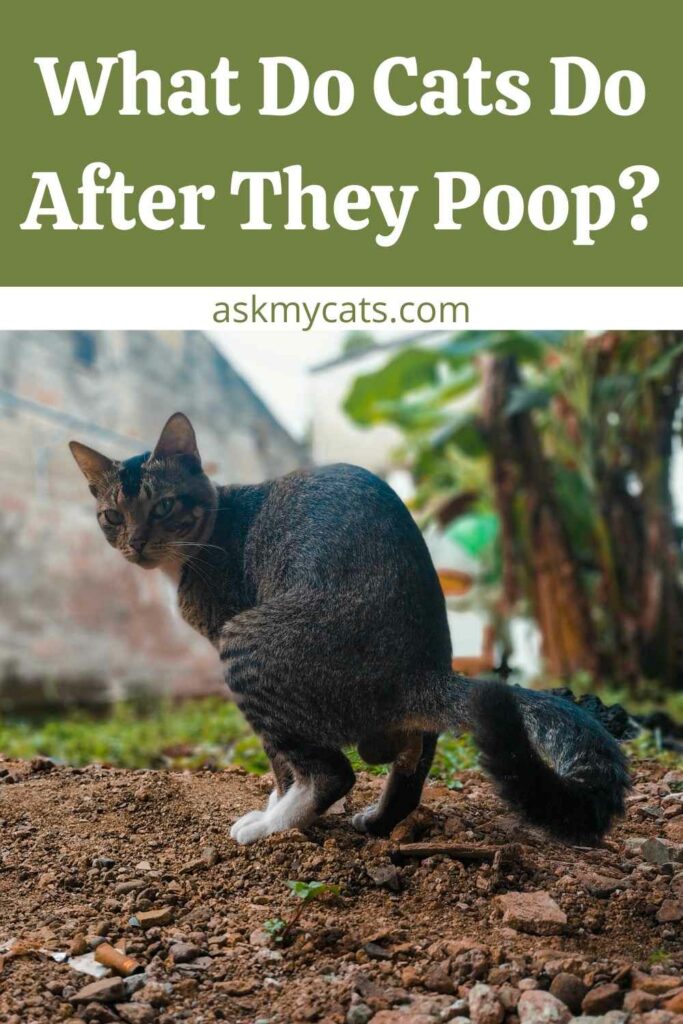Cats are inherently clean creatures, so they are prone to cleaning up after using the litterbox themselves. They usually have little to no residue from their potty routines.
Whether you discover feces on your cat’s bottom, you should inspect to determine if they are having looser-than-normal stools.
Cats are renowned for being extremely clean creatures, and they clean themselves using their tongues. They twist, bend and lick to clean all those hard-to-reach places.
But if your cat is suffering from any kind of mobility issues, it may interfere with their cleaning routine.
You wouldn’t want to lick your own crap either. Overweight cats may have difficulty reaching around to clean them, and elderly cats may have discomfort from arthritis while attempting to get into the proper posture.


Give Your Cat the Perfect Day
Get the Free Ebook!
Do Cats Clean Themselves After Pooping?
Cats love to clean themselves after pooping because they hate any kind of dirt or waste in their body.

Cats are picky and never like to touch excrement, pee, or anything else that smells bad.
They will make every effort not to dirty their paws. However, unintentional contact can occur.
Kittens have the impulse to utilize an ‘authorized’ spot, bury their droppings and urine, and then clean themselves.
They do, however, have a learning curve. They make a few errors as they figure things out.
They should never be penalized or reprimanded. That isn’t effective on kittens or cats. For the best outcomes, praise and affectionately reward them anytime they get it properly and make things simple for them.
Cats must use their tongues to wipe their behinds. They eat a smidgeon of whatever is left behind after elimination.
In most circumstances, their immune systems can defeat a disease in a relatively brief length of time.
However, if it is concentrated, it may overcome them. They could get contaminated. Cats in the wild are not easily exposed to excrement since they do not live in crowded surroundings.
They can always find a clean place to relieve themselves. Furthermore, the weather and natural surroundings contribute to the death of the organisms.
Cats in a house, on the other hand, are expected to use the same receptacle every time. They haven’t developed to be able to do this.
Check out what does it mean when a cat grooms itself in front of you
And if they must tread in excrement and wipe their feet with their tongues, they risk eating concentrated germs and parasites that can overwhelm their immune systems and make them sick.
The infectious bacteria are then concentrated in their feces, where they can be picked up by other cats who use the litter box. Furthermore, they may have clumsy diarrhea, exacerbating the situation.
Some of these infections (Giardia, intestinal worms, and so on) may also infect humans and other animals.
When people are careless about cleaning the litter box, it is difficult for the cat to escape the mess.
If the cat has soft, pudding-like feces or diarrhea, it is critical that they be removed from the litter box as soon as possible. Otherwise, the cat may continue to reinfect itself and roam around the house with filthy paws.
In those circumstances, tossing out all the litter after each usage is the recommended practice until the cat is healed. Use a low-cost, biodegradable litter, such as wood pellet horse bedding, which is available at feed stores.
Some cats may even try to stand on the edge of the litter box to avoid touching the soiled litter. But they still have to deal with the burial task. Furthermore, the entire structure might collapse.
As a result, it is critical to maintain litter boxes as clean as possible. The feces of a healthy cat should resemble lumpy tootsie rolls. You may sweep them out on a daily basis and change the litter as needed.
You might also like to know about why does my cat clean herself after i pet her
Do Cats Clean Poop Off Themselves?
No, cats do not directly clean poop off themselves. Some cats may try to wipe the poop off their bums by rubbing it on a mat or carpet. In most circumstances, you will need to assist your cat in becoming clean.

Cats brush themselves regularly for a variety of reasons, including the fact that it is quite sanitary. All of that grooming, on the other hand, helps them disperse natural skin oils, which maintains their coats silky and smooth.
Cats enjoy being warm, and frequent brushing helps them keep their body temperature stable. On hot days, their saliva also aids in cooling.
Constant grooming also aids in the stimulation of circulation. When a cat is clean, illnesses, parasites, and allergies are reduced. Another reason they are constantly grooming themselves is to keep hairballs at bay.
Excessive grooming can sometimes be a sign of a behavioral problem. Their grooming might stem from shame or even worry. If your cat is involved in a fight, it may groom excessively as a coping mechanism.
The typical cat spends 30 to 50% of its day grooming. This means you have a really clean kitten. However, if you find your cat grooming for more than half of the day, you should visit your veterinarian.
Grooming too often may result in fur loss or skin sores, as well as an indicator of another medical ailment. Fleas, parasites, stress, and anxiety are just a few of the numerous factors that might cause your cat to groom obsessively.
Also, find out why do cats clean themselves after they eat
What Do Cats Do After They Poop?
Cats try to bury or hide their poop immediately after pooping.

The practice of painstakingly burying their waste derives from cats’ long history of marking their territory with urine and excrement.
Cat excrement may all smell the same to humans, but cats can recognize their waste separately thanks to pheromones, which are chemical scent markers found in feline urine and feces.
In the wild, dominant cats such as lions, tigers, leopards, and jaguars that are contending for territory do not bury their feces as a form of expressing that they wish to occupy a certain region.
Smaller, weaker, or more submissive wild cats bury their excrement to keep stronger cats from feeling threatened.
To avoid alerting predators’ attention to themselves or their young, wild cats will conceal their feces. The same strong, self-protective impulses exist in domesticated indoor cats (Felis catus).
Even if there are no predators in your home, your cat may be wary and hide its waste just in case.
One reason your cat may refuse to use the litter box is that they believe they are in charge of you. However, this seeming defiant behavior may also be caused by a disease, urinary tract infection, gastrointestinal difficulties, or just a lack of teaching on how to correctly use a litter box.
Some kittens may need to be taught how to use a litter box since their natural burying inclination is encouraged by witnessing their moms do it.
Not only cats bury their feces to ward off predators and resolve territorial conflicts. Armadillos, woodchucks, minks, and other weasels have also been observed covering their waste.
You must be interested to know about how to clean poop off kitten paws
Do Cats Clean Their Bum?
Yes, cats clean their bum to remain fresh and maintain hygiene.
If your cat is constantly licking their buttocks or rubbing their behind on carpets and flooring, it might be a sign that they are cleaning something from their bum.
Grooming helps your cat stay healthy; therefore cats groom themselves on a regular basis. It allows them to keep cool in the summer because they are unable to sweat like humans.
In the winter, it also helps to keep their fur healthy by dispersing the natural oils that their bodies create to help retain heat.
This implies that their butt is not exempt from self-care, and because there is no such thing as kitty toilet paper, licking is their only option for keeping their bum clean.
You might be surprized to know about do cats eat their own poop
Why Do Cats Wipe Their Paws After Pooping?
Cats wipe their paws after pooping to hide the bad odor of poop stuck on their paws.
Cats will go to any length to keep the stink of their excrement covered. Their litter boxes aren’t always cleaned well enough or are the improper size. Getting a large enough litterbox with higher sides will likely halt any floor-scratching after pooping.
Cats sometimes acquire strange habits like wiping their paws on the floor after pooping. When a litter box fails to disguise the odor of its feces, this behavior develops. If this is the case, cleaning out the litter box will eliminate the odor of your cat’s excrement.
Why Does My Cat Rub After Pooping?
Cats rub after pooping to hide their poop immediately.
Cats are biologically programmed to hide their excrement, or at least quickly rub to conceal the smell of it. Consider the untamed forebears of the domestic cat in the wild. Wild cats are predators who must keep their presence disguised at all times.
This is a concern with cat waste since cat urine has a strong odor. In the wild, it’s a matter of life and death for cats to keep their smell hidden. Wild cats must conceal themselves from both prey and predators in order to feed and avoid being devoured.
Cats will rub and bury their excrement in the earth to disguise their presence. You will have seen this habit if your cat goes outside to perform its business.
Despite the fact that your house is nothing like the wild, your cat retains the instincts that it inherited from its wild ancestors.
Interesting Read: Why Do Cats Lick Each Others Private Area?
Why Is My Cat Not Cleaning Herself After Pooping?
Cats that have become old and suffering from medical issues do not clean themselves after pooping.
The most prevalent explanation for a cat’s inability to clean its own poop is physical inability. Reaching the bottom requires a lot of work for a cat. This is very painful for senior cats who are typically arthritic.
To stimulate grooming, manage your cat’s arthritic discomfort. It’s great if you keep your cat supple by giving him a little exercise. If your cat will let it, combine this with frequent massage.
Your cat will groom itself if it can manipulate its body well enough. This is also contingent on the cat’s weight-maintaining within reasonable bounds. A cat’s typical calorie intake can only be sustained if it remains active.
Obese cats frequently fail to wipe their bottoms. The cat is either unable to reach the grooming area or lacks the energy to do so. Fat cats are more likely to become exhausted and abandon their cleaning duties.
Frequently Asked Questions
How do cats know to clean themselves?
The surface of a cat’s tongue is rough due to many spines, called papillae. When a cat licks your skin and it feels like sandpaper, you may notice this. These papillae help grooming be more efficient by grabbing onto the fur and combing through it.
Do cats track germs from the litter boxes?
Cats are cleaner than dogs when it comes to keeping themselves tidy. However, they’re still putting their paws in the litterbox and walking around on them, which increases the risk of their taking up deadly germs and bacteria and tracking them over your kitchen surfaces.
Do cats enjoy cleaning themselves?
If you’ve ever been around cats, you’ve undoubtedly noticed that they lick their fur a lot. The major motive is to clean themselves, as you may have surmised. She claims that their grooming activity is similar to that of domestic cats.
Final Words
Cats, like people, aren’t quite as adaptable as they become older. Arthritis affects certain older cats. This makes it difficult for them to bend as far as they need to clean effectively. They might not be able to reach all the way back, so they’ll need your aid to keep clean and odor-free.
Leave your questions in the comments section below.
